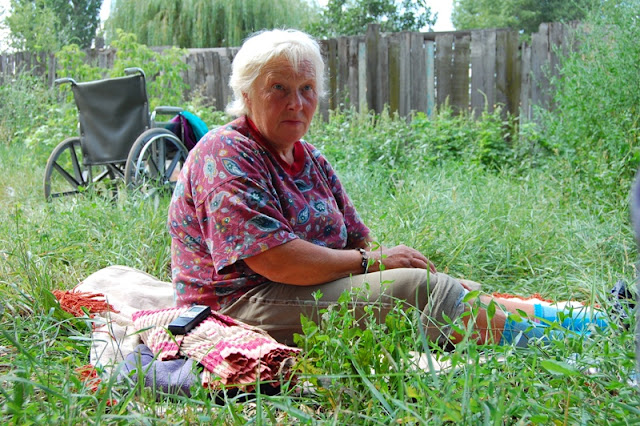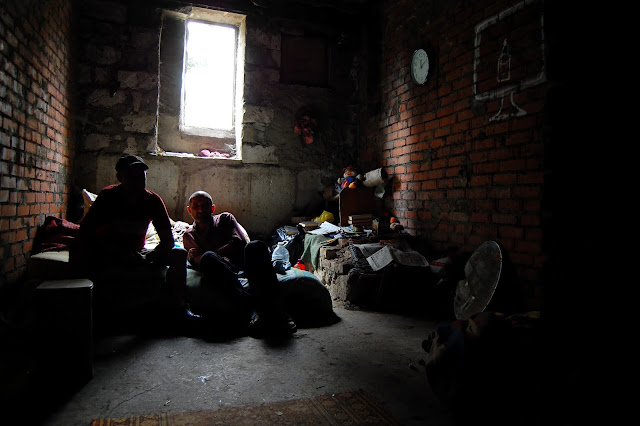Pleading for Democracy and Inclusion in Moldova - A project supported by US Embassy in Moldova
Endowment for Democracy Grants Program – US Embassy in Moldova
“Pleading for Democracy and Inclusion in Moldova”
Project coordinator: Petru Negura
Project Final Report
Our project, consisting of a series of social investigations, duly fulfilled its tasks. All five participants/contributors to our project submitted their investigations. All of these articles were reviewed by peers (from our team), revised by authors, and then published on the independent platform www.platzforma.md, from December 2015 to March 2016.
 |
| Photo by Aurelia Borzin. |
Hereby are the links to all published investigation articles:
1. Aurelia Borzin: "Pacienţii dintr-un spital de psihiatrie în tranziţie: între depersonalizare şi strategii de supravieţuire"[The patients of a psychiatric hospital in transition: between de-personalization and survival strategies”] (first part): http://www.platzforma.md/pacientii-dintr-un-spital-de-psihiatrie-in-tranzitie-intre-depersonalizare-si-strategii-de-supravietuire-1/
and: „Pacienţii dintr-un spital de psihiatrie în tranziţie: între depersonalizare şi strategii de supravieţuire” [The patients of a psychiatric hospital in transition: between de-personalization and survival strategies”] (second part): http://www.platzforma.md/pacientii-dintr-un-spital-de-psihiatrie-in-tranzitie-intre-depersonalizare-si-strategii-de-supravietuire-ii/
2. Cristian Ciobanu: "Pledoarie pentru democrație și incluziune: femeile din Republica Moldova" [Pleading for democracy and inclusion: the women of the Republic of Moldova] (first part): http://www.platzforma.md/pledoarie-pentru-democratie-si-incluziune-femeile-din-republica-moldova/
„Femeile rome: limitarea accesului la educație” [The Roma women: a limited access to education] (second part): http://www.platzforma.md/femeile-rome-limitarea-accesului-la-educatie/
and: „Femeile în vârstă din Republica Moldova: lipsirea de o pensionare demnă” [The aging women in the Republic of Moldova: lack of a decent retirement]: http://www.platzforma.md/femeile-in-varsta-lipsirea-de-o-pensionare-demna/
3. Corina Ajder: „Femeile Moldovei – muncă ieftină şi comodă pentru miliardarii Europei [Moldova’s women – a cheap labor force for the billionaires of Europe] (first part): http://www.platzforma.md/femeile-moldovei-munca-ieftina-si-comoda-pentru-miliardarii-europei-1/
and: „Nici în Europa, nici în Moldova munca decentă încă nu este o prioritate. Dar cum o putem face?” [Neither in Europe, nor in Moldova, the decent labor is not a priority. But how can we do it?] (second part): http://www.platzforma.md/nici-in-europa-nici-in-moldova-munca-decenta-inca-nu-este-o-prioritate-dar-cum-o-putem-face/
4. Petru Negură: „Persoanele fără adăpost din Chişinău: forme de excluziune şi strategii de adaptare” [The homeless people of Chisinau: forms of exclusion and adjustment strategies] (first part): http://www.platzforma.md/persoanele-fara-adapost-din-chisinau-forme-de-excluziune-si-tactici-de-supravietuire-1/
and „’Ei îs nişte paraziţi ai societăţii…’. Muncă şi subzistenţă printre persoanele fără adăpost din Chişinău” [‘They are social parasites…’. Labor and subsistence among the homeless in Chisinau] (second part): http://www.platzforma.md/ei-is-niste-paraziti-ai-societatii-munca-si-subzistenta-printre-persoanele-fara-adapost-din-chisinau/
5) Vitalie Sprînceană: „Religie și libertate religioasă în Republica Moldova” [Religion and religious liberties in the Republic of Moldova] (the whole version): http://www.platzforma.md/religie-si-libertate-religioasa-in-republica-moldova/
The social investigations: a summary description
All the elaborated and published investigations filled a gap in the Moldovan public sphere in terms of knowledge and information about certain marginalized groups in our society, namely: the psychiatric patients, certain categories of women (mothers with small children, Roma women, and aged women), the local workers in the international textile factories, the homeless people, and the marginalized religious groups.
Aurelia Borzin’s article on psychiatric patients in Moldova uses original ethnographic material – more than 35 interviews with patients from the Central psychiatric hospital, as well as with their family members, and medical personnel. Thus, the article fulfils a significant gap left behind by the investigations and reports realized by certain human rights organizations in Moldova that had so far limited access to patients’ testimonies. A. Borzin was also allowed to observe the daily life and routine in the psychiatric hospital. This said Borzin’s article shall be considered as a significant contribution to the exploration of psychiatric patients’ perceptions, opinions, and understanding about the psychiatric treatment and the post-treatment experiences, as well as of their coping efforts and strategies. Analyzing this rich ethnographic material, A. Borzin comes up, in the article’s conclusion, with a series of final remarks and recommendations aiming at limiting the various forms of alienation, oppression, and exclusion of these people, both during the treatment process in the hospital, and afterwards, within the society as a whole.
Cristian Ciobanu supports his article upon a quite large array of secondary quantitative and ethnographic material on three categories of marginalized women (young mothers, Roma, and elderly). Ciobanu’s original contribution consists in synthesizing and analyzing the existing data about the social, institutional and legal forms of marginalization and exclusion of these categories of women in Moldova from the labor market, educational system, and social welfare services. Ciobanu points out a series of structural mechanisms of marginalization and exclusion at work within society at large and in the public and private institutions. He also recommends some elements of intervention in order to prevent and diminish exclusion mechanisms and empower women to defend their rights.
Corina Ajder makes a very interesting and necessary investigation based on original data (interviews, some quantitative data) on the situation of Moldovan workers (mainly women) in the local textile factories contracted by international clothing brands (like H&M, Zara, Mango, etc.). Corina Ajder describes and analyzes the conditions in which the employees in those factories are underpaid, even compared to local wage standards. She also identifies other forms of abuses in the labor process, such as overtime work, “encouraged” by employers, performed in the same conditions as a regular workload. In the second part of her article, Corina Ajder advances a number of strategies to put pressure on the Moldovan government and EU administration to adopt some measures aiming at reducing the labor abuses and violations of labor rights in the local factories, including those contracted by international brands. The author also tries to sensitize the clothes “fans” towards a more “ethical” consumption.
Vitalie Sprînceană’s article theorizes and analyzes the pattern of marginalization and exclusion of various confessional groups and beliefs from the local public space by the society at large, via its dominant institutions (the Orthodox Church, and more precisely the Moldova Patriarchy) and the government. The article is empirically supported by a number of interviews, secondary statistical data, and the monitoring of the current media space. The pattern of marginalization and exclusion works on different axes (local vs. international, past vs. present, traditional vs. new, indigenous vs. “imported”). In his article, Sprînceană develops an “extreme” case, the Muslims, the religious group the most subjected to various forms of social discrimination and institutional abuses. In order to address the blatant inequality between the Orthodox Church and the “minority” religious groups, and to de-politicize the role of Moldova Patriarchy, the author proposes two ‘amendments’ in the current balance of power: the creation of a local, “autocephalous” Orthodox Church and encouraging the leaders of various religious groups to access power positions.
Petru Negură’s article tries to shed light on the situation of homeless people in Chisinau, based on a rich body of original statistical and ethnographic data (including a statistical data basis with about 600 biographic cases, interviews with more than 30 people, content analysis of the relevant press articles of the last 5 years, etc.). The author seeks to discern the social, economic and historical factors that produce homelessness in our society. It studies the daily difficulties and multiple forms of discrimination and exclusion faced by homeless people in Chisinau, but also the coping strategies set up by these people in order to survive and adjust to the mainstream society. One of the assets of this pioneering study in the Moldovan context is the in-depth analysis of the difficult relations of the homeless with the labour market in Moldova (and, particularly, in Chisinau). The article formulates a number of recommendations to the Moldovan government, especially the Ministry of Family, Labor, and Social Welfare and outlines a few perspectives toward a strategy of fighting the homelessness and integrating the homeless people into the labour market and the society as a whole.
Distribution, reception, and follow up activities
All these articles were published on the independent platform platzforma.md (usually, each article in two parts), then widely shared on Facebook and other social networks. On the later, the articles became the subjects of appreciations and stimulated fruitful discussions. Some of these articles (e.g. Corina Ajder’s article) were also re-published by other platforms.
It is our pleasure to announce that the articles will also be published soon in a separate section within a collective volume about Moldova during its post-Soviet transformation (to be published at Cartier, August 2016, in a book funded by the Ministry of Culture), coedited by Petru Negura and Vitalie Sprîneană (coordinator and participants in the current project). These articles will thus certainly become a key material in the process of discussion and design of corresponding policies by different administration bodies, including and especially the ministries, but also specialized NGOs and independent activist groups. Just to give an example, the article about the homeless in Chisinau drew the attention of a British NGO (“The OAK Foundation”), specialized in assisting vulnerable people, including homeless. So, the article’s author was contacted by some of NGO’s representatives to discuss possible strategies of intervention, in order to help these people in Chisinau. It is foreseeable that this later investigation will be a significant element for a policy shift in relation to this group of people.
Most of these articles’ authors will continue their research on these topics, further generating reflection and planning different ways of active involvement to address the issues raised in their studies. Professional and even academic research is going hand in hand with more concrete, pragmatic strategies of intervention. To bring another example, Aurelia Borzin recently enrolled in a PhD where she is further developing the issue studied in her investigation. But she also has a more concrete project to work in – and later on to create – an alternative day centre for psychiatric patients, with an innovative, subject-centred, socially inclusive approach to treatment and patients. Corina Ajder represents a similar example. She intends to enrol in a PhD with the subject of her investigation. At the same time, she is working in an international NGO advocating for the rights of local workers employed in factories contracted by international brands.
In conclusion, we could state that the investigations elaborated under this project turn out to be a real success. In addition, these studies have a strong potential to generate further reflection and concrete actions, aiming at questioning the current status quo and to engage in a deeper process of institutional and societal change.
Total project budget: USD 6,500.


Comments